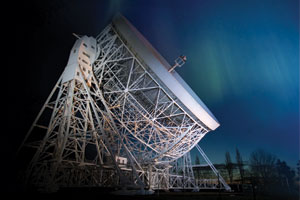How a mistake uncovered the secrets of the universe
23 Jun 2016
From the dawn of the Space Age to the world's biggest ever radio telescope, Jodrell Bank celebrates 70 years of discovery

Rising up out of the foggy expanse of the flat Cheshire countryside, you can't help but be awe-struck by the mighty Lovell Telescope at Jodrell Bank. Enormous and imposing: it knows the secrets of the universe.
Jodrell Bank is as indomitable in reputation as it is in stature. Now celebrating its 70th year, Jodrell Bank has been integral to huge, game-changing events in the history of astrophysics and our understanding of the cosmos.
"It's all based on a mistake," Teresa Anderson, Director of the Discovery Centre at Jodrell Bank, reveals, quite on purpose. "Back in 1945, Sir Bernard Lovell came to the site to explore his ideas on cosmic rays but he'd got his maths wrong and the work ended up taking an entirely different direction."
As Teresa utters these words, her face does not portray disappointment but gleams with pride and excitement. Getting things wrong in science is ok, it turns out – in fact it is welcomed.
"That mistake triggered a new direction and because of that the telescope has discovered things that were never imagined at the time it was created," she continues. "That's the thing about big science – you just don't know what you're looking for."
It's this certainty that we can't be certain about anything that drives the success of this place.
Jodrell Bank played a key role in the emergence of radio astronomy, which transformed the way we see the Universe.
"Using non-visible radio waves and other 'invisible' parts of the spectrum to build up an image of the unknown means we can see things way beyond the capabilities of the human eye. It's easy to forget but radio astronomy was the birth of modern astrophysics," says Teresa.
It is clear that Jodrell has been at the forefront of some incredible historical firsts and remains an international leader securing projects such as the Square Kilometre Array (SKA), the world's largest ever radio telescope, headquartered at Jodrell and made up of an array of thousands of dishes spread out in remote areas across the planet.
"The very first thing the Lovell Telescope did marked the dawn of the Space Age - it tracked the carrier rocket for Sputnik 1 – the first ever satellite launched into space."
Jodrell Bank was also responsible for producing the earliest picture of the surface of the moon in 1966 by hacking into signals destined for the Soviet Union from the Luna 9 spacecraft.
Such an illustrious history is only surpassed by the possibilities of its future as the scientific prowess of Jodrell Bank continues to dazzle. These days, it's the discovery of the double pulsar and the fact it is host to the ground-breaking SKA that define it.
"The SKA is a huge project," Teresa says. "It's been called the 'CERN of Astrophysics' and will be the biggest science project ever known.
"We'll be able to see the universe in more detail than has ever before been possible and examine fundamental ideas like the origins of the universe, gravity and the beginnings of life."
Looking to the future, the exciting thing, according to Teresa, is that we have no idea what discoveries it will hold.
Jodrell's Associate Director and Professor of Astrophysics, Tim O'Brien, explains: "Our Milky Way galaxy is around 100,000 light years across and contains hundreds of billions of stars, the vast majority of which we now know are orbited by planets. The observable Universe contains hundreds of billions of galaxies. Whether any of these thousands of billions of planets harbours life, we don't yet know, but as our technology improves we steadily get closer to finding out."
The possibilities at Jodrell Bank seem as boundless as the universe itself. Teresa muses: "There will be lots of things we haven't even thought of and people will think we've been doing it all wrong but that's great.
"In science we always want to be proved wrong; it means we've discovered new things."
